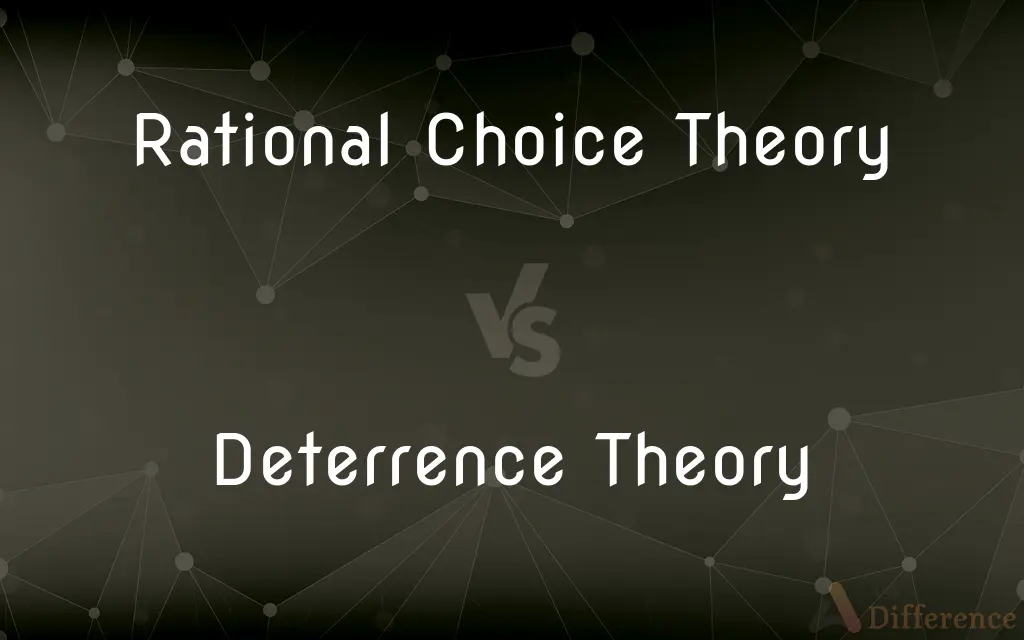Rational Choice Theory vs. Deterrence Theory — What's the Difference?
By Tayyaba Rehman — Published on January 6, 2024
Rational Choice Theory focuses on individuals making decisions based on self-interest; Deterrence Theory emphasizes preventing actions through fear of punishment.

Difference Between Rational Choice Theory and Deterrence Theory
Table of Contents
ADVERTISEMENT
Key Differences
Rational Choice Theory posits that individuals make decisions based on a logical evaluation of potential outcomes to maximize their benefits. Deterrence Theory, on the other hand, suggests that people can be dissuaded from committing undesired actions through the threat of punishment.
In Rational Choice Theory, it's believed that every decision is a calculated choice weighing pros and cons. Deterrence Theory operates on the principle that the fear of severe consequences can be a stronger motivator than potential benefits.
The foundation of Rational Choice Theory lies in the belief that individuals act rationally, with complete information, aiming for personal gain. In contrast, Deterrence Theory believes that punitive measures can be effective in discouraging undesired behaviors.
Rational Choice Theory often comes into play in economic models and assumes perfect information for decision-makers. Deterrence Theory is frequently associated with criminal justice, proposing that potential criminals are deterred if they perceive the costs of committing a crime as outweighing the benefits.
Essentially, Rational Choice Theory emphasizes decision-making processes, while Deterrence Theory emphasizes the role of external threats in influencing those decisions.
ADVERTISEMENT
Comparison Chart
Focus
Decision-making based on self-interest
Preventing undesired actions through fear of punishment
Associated Discipline
Economics
Criminal Justice
Key Assumption
Individuals act rationally with complete information
Fear of punishment can deter actions
Primary Application
Economic models and consumer choices
Criminal behavior and international relations
Relation to Behavior
Explains why individuals choose a certain action
Explains how external threats prevent certain actions
Compare with Definitions
Rational Choice Theory
Central to many economic models to explain consumer behavior.
Using Rational Choice Theory, economists can predict market trends based on perceived consumer benefits.
Deterrence Theory
Often associated with criminal justice and international relations.
Using Deterrence Theory, lawmakers establish severe penalties for serious crimes to discourage offenders.
Rational Choice Theory
Rational Choice Theory suggests individuals make decisions based on calculated self-interest.
According to Rational Choice Theory, shoppers will buy items on sale if they believe they're getting a bargain.
Deterrence Theory
It operates on the belief that potential consequences influence behaviors.
Deterrence Theory suggests that increased police presence will reduce crime in a neighborhood.
Rational Choice Theory
Assumes individuals act rationally and with complete information.
Rational Choice Theory would argue that an investor would only buy stocks he believes will profit in the future.
Deterrence Theory
Focuses on preventing actions rather than understanding choice reasons.
Deterrence Theory supports the idea that visible security cameras deter shoplifting.
Rational Choice Theory
It posits that every decision is a product of weighing pros and cons.
In Rational Choice Theory, a student might choose a college based on its reputation and tuition costs.
Deterrence Theory
Deterrence Theory proposes that the threat of punishment can prevent undesired actions.
Deterrence Theory is the basis for strict laws against drunk driving.
Rational Choice Theory
Emphasizes the decision-making process of individuals.
Through Rational Choice Theory, researchers understood why certain products sell more during the holiday season.
Deterrence Theory
It emphasizes the role of external threats in decision-making.
Countries maintain nuclear arsenals based on Deterrence Theory, to dissuade others from attacking.
Common Curiosities
How does Deterrence Theory work?
It proposes that the threat of punishment can prevent undesired actions.
In what contexts is Rational Choice Theory commonly applied?
Mainly in economic models and consumer choices.
Is Deterrence Theory only applicable to criminal justice?
No, it's also applied in international relations and other disciplines.
Does Rational Choice Theory assume perfect information?
Yes, it typically assumes individuals act with complete information.
What's the main difference between Rational Choice Theory and Deterrence Theory?
Rational Choice focuses on decision-making processes, while Deterrence emphasizes external threats.
What is Rational Choice Theory?
It's a theory suggesting individuals make decisions based on calculated self-interest.
Are there criticisms of Rational Choice Theory?
Yes, critics argue that not all decisions are rational or based on complete information.
What are the limitations of Deterrence Theory?
It may not work if individuals don't perceive the threat as credible or if they're not rational.
What drives decisions in Rational Choice Theory?
Calculated self-interest based on available information.
How does Deterrence Theory relate to nuclear arms?
It's used to explain why countries maintain nuclear weapons as a deterrent against potential attackers.
Can Deterrence Theory be used in policy-making?
Yes, especially in policies aiming to prevent undesired actions through the threat of punishment.
How can Deterrence Theory influence international relations?
By discouraging aggressive actions through the threat of retaliation.
Does Deterrence Theory suggest that punishment always works?
No, but it suggests that the fear of punishment can be a strong deterrent if perceived as credible.
How does Rational Choice Theory view human behavior?
It views behavior as rational and driven by self-interest.
Is Rational Choice Theory always accurate?
No, it's a model and, like all models, has its limitations.
Share Your Discovery

Previous Comparison
Graphene vs. Graphene Oxide
Next Comparison
Ethanol vs. MethoxymethaneAuthor Spotlight
Written by
Tayyaba RehmanTayyaba Rehman is a distinguished writer, currently serving as a primary contributor to askdifference.com. As a researcher in semantics and etymology, Tayyaba's passion for the complexity of languages and their distinctions has found a perfect home on the platform. Tayyaba delves into the intricacies of language, distinguishing between commonly confused words and phrases, thereby providing clarity for readers worldwide.
















































